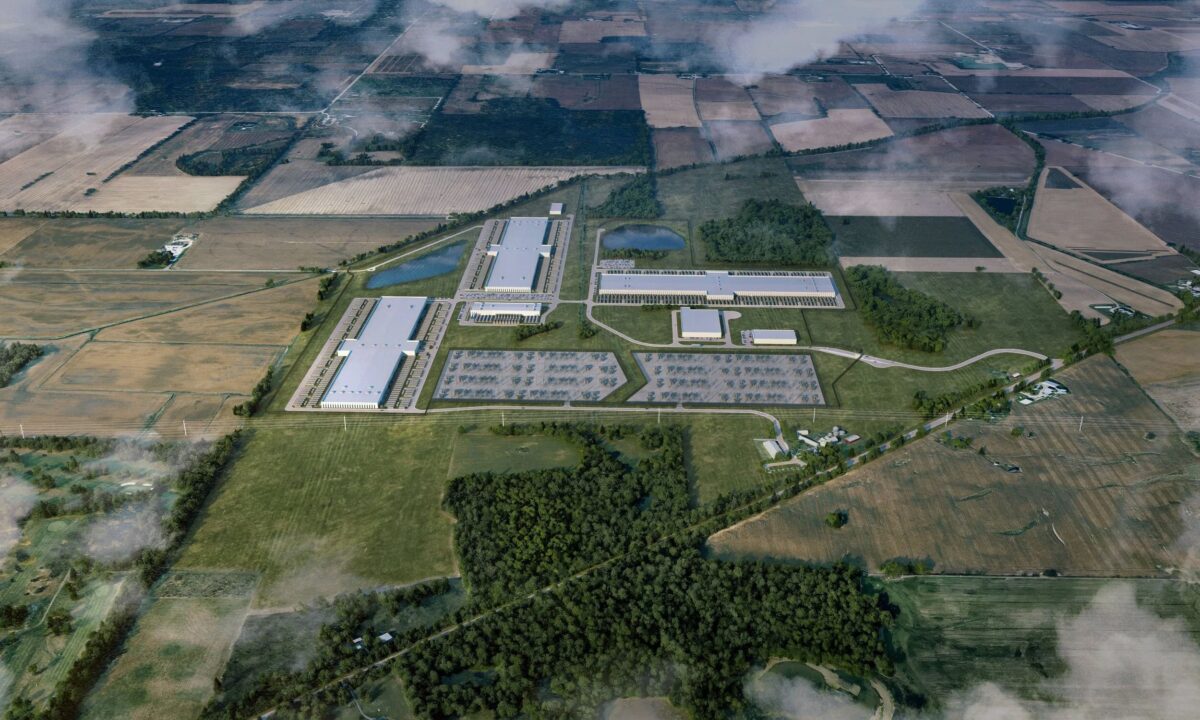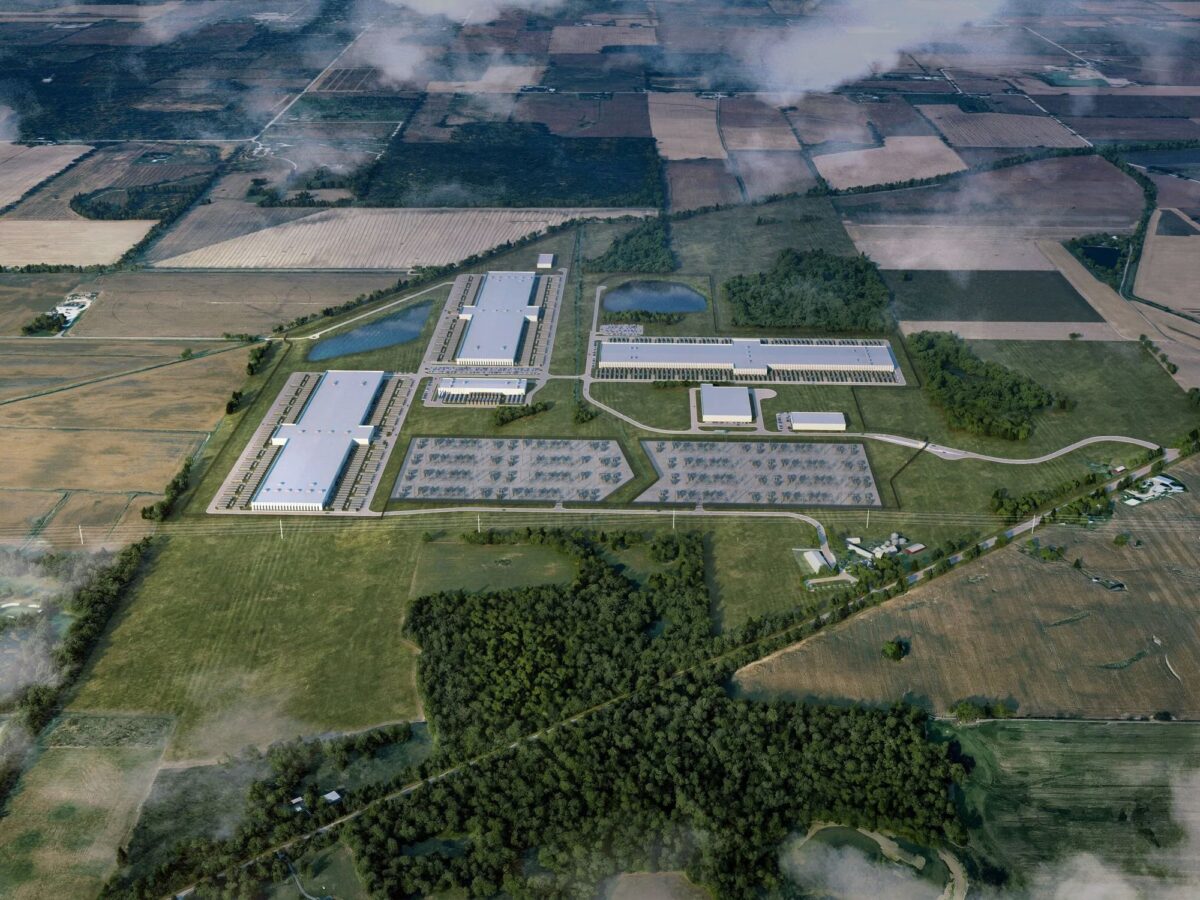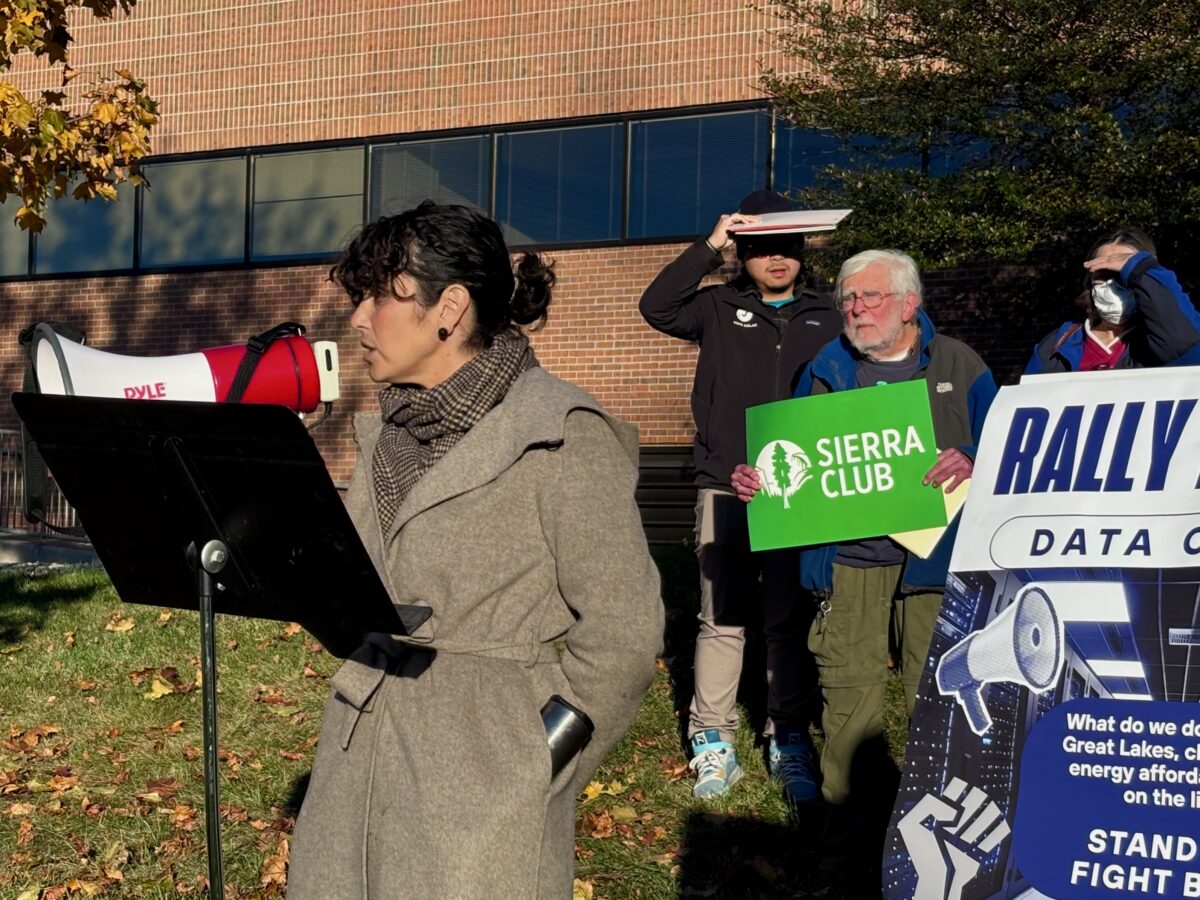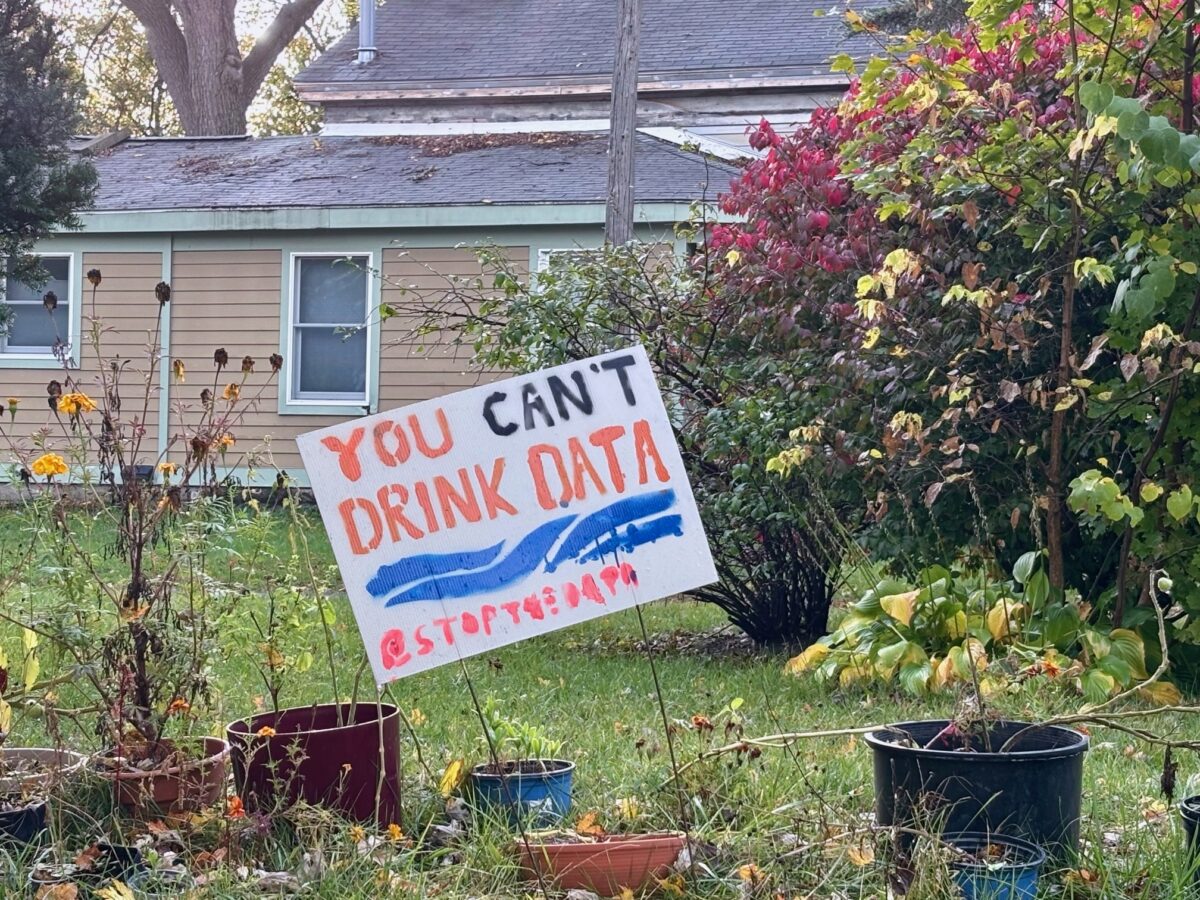Overview:
- Michigan Attorney General Dana Nessel intervenes in DTE Energy's regulatory filing for Saline Township data center, says well-being of the utility's customers at stake.
- Additional data centers beyond the Saline Township project will require more power generation using natural gas, says DTE Energy CEO Joi Harris.
- Read on for Planet Detroit's tips on how you can make your voice heard on Michigan data center developments.
DTE Energy is pressing Michigan regulators to fast track approval of the Stargate data center in Saline Township before year’s end, warning that any delay could jeopardize the project’s planned construction start in early 2026.
Michigan Gov. Gretchen Whitmer announced the finalization of plans for the state’s first large data center in Saline Township last week, renewing concerns about climate impacts from the facilities’ energy demands. The Saline Township project is being developed by ChatGPT maker OpenAI, Oracle, and Related Digital.
The data center moved forward after Related Digital sued Saline Township over rezoning for the facility, and the township reached a settlement with the company Oct. 15. Municipal attorney Fred Lucas described the settlement as “the lesser of two evils” in comments to Planet Detroit.
The planned $7 billion hyperscale data center development follows the passage of state tax credits earlier this year intended to lure the power- and water-hungry facilities to Michigan.
“Given the sizable affordability benefits for our customers, as well as the economic impact the project will have, we think moving forward in this fashion makes the most sense,” DTE spokesperson Jill Wilmot said of the utility’s request for expedited regulatory approval of the Saline Township project.
Michigan AG: Saline data center will affect DTE ratepayers
Michigan Attorney General Dana Nessel intervened Thursday in the Saline Township data center case and requested it be treated as a contested proceeding, allowing for 180 days from the date of DTE’s Halloween application before a decision is issued by the Michigan Public Service Commission, or MPSC.
In the event of an expedited review, Nessel asked for at least two months for intervenors to review the case and conduct discovery.
“Any action taken in this proceeding will directly affect the economy of this state and the general well-being of residents in DTE’s service territory, and may impact the state’s ability to achieve its renewable and clean energy standards established by the legislature,” Nessel said in the filing.
In an affidavit filed by Nessel, expert witness Sebastian Coppola said it is “misleading” for DTE to state that the electric contracts tied to the Saline Township development will not increase customer rates, and said they will be affected when the contracts begin in 2027.
The contracts proposed by DTE “entail hundreds of millions of dollars of capital commitments which will affect customer utility rates over at least two decades,” Coppola said.
Read Planet Detroit’s guide to the MPSC, which oversees the state’s utilities.
Additional data centers will require natural gas resources: DTE Energy CEO
On a company earnings call the same day as Whitmer’s announcement, DTE Energy President and CEO Joi Harris said “near term data center growth” will improve electricity affordability as the utility sells excess generation.
Bryan Smigielski, a campaign organizer with the Michigan Sierra Club, said DTE’s regulatory filing doesn’t show how transmission costs will be paid, nor does it account for climate impacts from power plants that supply the facility.
“We currently do not have an energy emergency, but it’s almost as if they are trying to create one by not allowing us to do the full planning for renewables,” he said.
The Sierra Club will push for full transparency around the project and potentially a contested case for DTE’s filing, Smigielski said.
Harris said on the earnings call that a data center, matching the description of the Saline Township site, would use 1.4 gigawatts of energy, equivalent to 25% of the utility’s entire energy load. DTE is in “late-stage negotiations” with data center developers that could drive a further 3 GW of load growth, with a pipeline of 3 to 4 GW beyond this.
The Saline Township project will be supported by battery storage, paid for by the data center customer, and will not require new fossil fuel generation, the DTE CEO said.
Additional data centers will require more generation, and the utility will propose the replacement of its massive Monroe coal plant with natural gas generation, she said.
“Any new data center load that we bring on after this 1.4 gigawatts will require additional resources,” Harris said, adding a project in the 1-gigawatt range would require a “combined cycle,” referring to a combined cycle gas plant.
Consumers Energy has 1-2 GW of data centers in the final stage of negotiations, 4-5 GW in “advanced” discussions, and a total pipeline of 9 GW in projects, according to a presentation from the utility’s earnings call last week.
The projects will mean “more renewables, battery storage, and natural gas generation to meet growing demand,” said Garrick Rochow, president and CEO of CMS Energy and its subsidiary Consumers Energy.
Data center demand could allow utility to ‘opt out’ of climate law
Data centers’ expected energy demands could trigger an “off ramp” in Michigan’s 2023 renewable energy law that allows utilities to keep fossil fuel generation online if there’s not enough capacity to meet demand, environmental advocates said. The climate law otherwise requires utilities to meet a goal of 100% renewable energy generation by 2040.
“If this build out of data centers happens across the state, it is going to enable companies like DTE and Consumers to opt out of clean energy standards,” Sean McBrearty, Michigan director for the nonprofit Clean Water Action, told Planet Detroit. “They’ll get to build more gas plants (and) charge Michigan ratepayers.”
The Saline Township data center and other Michigan projects have met widespread resistance over concerns the projects could hike residents’ utility bills and imperil water resources.
DTE’s Wilmot said a combined cycle natural gas plant with carbon capture and storage, or CCS, is one technology the utility was considering for future generation needs.
Consumers spokesperson Matt Johnson didn’t directly answer a question on whether the utility is considering CCS for future gas plants. Consumers will develop “new resources and technologies, and deliberate planning, all in line with Michigan’s 2030 energy law and without compromising our sustainability goals,” he said.
Michigan classifies CCS as “clean energy” if it captures 90% of gas plant carbon emissions, although advocates raised concerns with Planet Detroit about its cost, effectiveness, and safety.
How data centers could drive gas generation, pollution
The Consumers and DTE data center plans could change the trajectory of energy generation in the state and make it more cost-effective to keep fossil fuel generation online or increase production from natural gas plants, Charlotte Jameson, chief policy officer at the Michigan Environmental Council, said.
Batteries at the Saline Township site will utilize DTE’s existing energy mix, including gas and coal, and could cause the company to run its Belle River gas plant more, she said. Belle River is a “peaking” power plant, meaning it operates during times of high demand.
DTE and Consumers didn’t directly answer questions on whether peaking plants will operate more often to meet data centers energy needs.
Jameson also expressed concern about the proposal to turn Monroe into a gas plant, saying it could be replaced with batteries and renewables.
Investor-owned utilities may be incentivized to build large projects like gas plants because companies can earn their return on equity on infrastructure investments. This means DTE shareholders can earn the company’s roughly 10% rate of return on a portion of the cost of these projects, which is paid by customers.
“We can’t find a bigger capital project than building a huge gas plant,” she said, adding that the company has affiliates with an interest in prolonging natural gas use.
More gas generation could increase air pollutants like nitrogen oxides, Jameson said. Nitrogen oxide exposure can aggravate respiratory diseases, especially asthma and, over long periods of time, lead to the development of asthma and increase the susceptibility to respiratory infections, according to the Environmental Protection Agency.
Dr. Larry Junck, a neurologist and member of the board of directors for the group Michigan Clinicians for Climate Action, told Planet Detroit that more gas generation in the state will add carbon pollution and contribute to climate change-related health impacts.
Is carbon capture a solution for data center climate concerns?
Environmental advocates question the feasibility of carbon capture and storage as a solution to the climate conundrum posed by data centers, and express concerns about its cost, efficiency, and safety.
“Permitting doesn’t account for the energy penalty of carbon capture,” said the Michigan Environmental Council’s Jameson, adding that regulators needed to consider the additional emissions created by capturing carbon from a power plant.
CCS increases the fuel requirement for a natural gas combined cycle plant by 11%-22%, according to an Intergovernmental Panel on Climate Change report.
Ratepayers could also be left paying for the stranded costs of CCS gas plants if they don’t function as intended, Jameson said.
A 2023 report from the nonprofit Institute for Energy Economics and Fiscal Analysis refers to CCS as an “expensive and unproven technology,” finding that no CCS project successfully captured more than 80% of carbon emissions.
“There’s a short track record on CCS … however, the track record that it has is pretty concerning,” said Clean Water Action’s McBrearty.
He called attention to the 2020 gas leak from a CCS pipeline in Satartia, Mississippi, which led to the hospitalization of nearly 50 people, according to a report in the Huffington Post.
Public officials could take steps to avoid the problems associated with fossil fuel use and CCS, McBrearty said.
A resolution adopted by the Washtenaw County Commission in September urges local governments to require data centers to source 100% of energy from wind, solar, battery, or geothermal sources, among other provisions.
“It’s a pretty easy fix, especially when you consider that the companies that want to operate these mega data centers are some of the most profitable companies in the world,” McBrearty said.
Building out more solar to power data centers could add to the strain in communities where some residents oppose large solar developments as well as data centers.
Saline Township resident Kelly Coleman opposed the data center in her community as well as a roughly 900-acre solar project. The developments will take up too much of the township’s agricultural land, Coleman said, adding that she would be willing to accept a smaller project.
“It’s like a giant ball that just keeps rolling and growing once you need more renewable energy for these data centers,” she said. “How many farm fields is that? How many acres is that to produce just for that one building?”
Dustin Blitchok contributed to this report.
🗳️ Civic next steps: How you can get involved
Why it matters
⚡ OpenAI’s Saline Township data center and other projects in DTE Energy and Consumer Energy’s territories could impact Michigan energy customers’ utility bills. Power demands from these projects could also make it more difficult for the state to meet its climate goals, depending on what generation sources are used.
Who’s making civic decisions
🏛️ The Michigan Public Service Commission, the state utility regulator, will consider DTE’s filing for the data center and could allow for a contested case in which testimony can be submitted.
How to take civic action now
- 📅 Attend the next MPSC meeting, 1-2 p.m. Dec. 5, in-person and online.
- 🌱 Follow the Sierra Club Michigan Chapter and Citizens Utility Board of Michigan for advocates’ viewpoints on MPSC activities.
- 📩 Email the MPSC at LARA-MPSC-commissioners@michigan.gov.
- ✉️ Mail the Michigan Public Service Commission, PO Box 30221, Lansing, MI 48909
- 📣 Ask the commission if it will open DTE’s filing for the Saline Township data center as a contested case.
What to watch for next
🗓️ The MPSC may discuss DTE’s filing for the Saline Township data center at an upcoming meeting. DTE will also file its integrated resource plan in 2026, which could determine how power is supplied to data centers.
Civic impact
🌍 Following and engaging with the MPSC is one way residents can help influence the impact data centers have in the state.
⭐ Please let us know what action you took or if you have any additional questions. Please send a quick email to connect@planetdetroit.org.
MORE DATA CENTER COVERAGE
Developer announces $7 billion data hyperscale data center in Saline Township after settlement
Tech giants OpenAI, Oracle, and developer Related Digital are set to transform Saline Township with a $7 billion hyperscale data center project, with construction slated to begin in 2026.
Michigan utility customers need protection from data center costs, demonstrators say
The chair of Michigan’s utility regulator warns “lumpier” data center power demand growth could stick other customers with costs.
Ypsilanti City Council calls for halt to University of Michigan data center project
Ypsilanti council opposes University of Michigan data center with resolution that draws attention to potential environmental impacts and Los Alamos’ nuclear weapons work.





